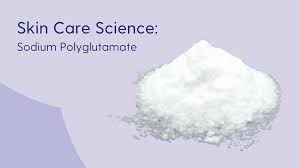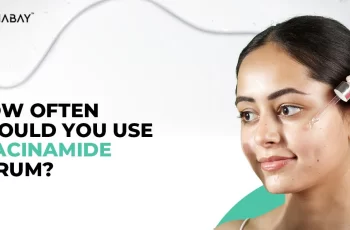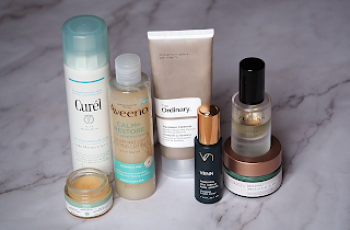
Sodium Polyglutamate in Skin Care
Sodium Polyglutamate (PGA) is a potent humectant derived from fermented soybeans, known for its exceptional moisture-retention abilities. This naturally occurring biopolymer has garnered significant attention in the skincare industry due to its superior hydration capabilities, which some studies suggest surpass even hyaluronic acid (HA). PGA’s unique molecular structure allows it to hold up to 5000 times its weight in water, making it a crucial ingredient for maintaining skin moisture. Beyond its hydrating properties, research has also indicated that PGA may inhibit hyaluronidase, the enzyme responsible for breaking down HA in the skin, thereby prolonging the presence of HA and enhancing overall skin hydration.
In this blog, we discuss PGAs abilities and why it is found in some luxury skincare brands. To find out which ingredients and products are best for your skin, take our skin type quiz and you can shop using your skin type.
Intensely hydrating
Binds 5000x it’s weight in water
Blocks breakdown of hyaluronic acid
Found in humectant moisturizers
What is Sodium Polyglutamate in Skin Care?
Sodium Polyglutamate (PGA) is a powerful skincare ingredient composed of repeating units of the amino acid glutamic acid. This biopolymer is primarily derived from the fermentation of soybeans, where specific bacteria synthesize it as part of their metabolic processes.
How it Works
Sodium polyglutamate’s ability to form a protective film on the skin’s surface not only helps retain moisture but also enhances the skin’s elasticity and smoothness. Additionally, PGA has been shown to inhibit hyaluronidase (1), the enzyme that breaks down hyaluronic acid, thereby extending the hydration benefits of hyaluronic acid in the skin. These properties make Sodium Polyglutamate an exceptional ingredient for boosting skin hydration, improving skin texture, and offering long-lasting moisture retention, surpassing even hyaluronic acid in some aspects.
Blocks Hyaluronidase
Hyaluronidase is an enzyme that breaks down hyaluronic acid (HA), a key substance in the skin responsible for maintaining moisture, elasticity, and volume. HA is a glycosaminoglycan that can attract and retain water, keeping the skin hydrated and plump. When hyaluronidase degrades these HA molecules, the skin loses moisture and elasticity.
Maintaining high levels of HA is essential for keeping the skin hydrated, smooth, and youthful-looking. Sodium Polyglutamate (PGA) inhibits hyaluronidase, preserving HA levels in the skin. By blocking this enzyme, PGA helps the skin retain moisture, enhances the effectiveness of HA-based skincare products, and promotes longer-lasting hydration and a more youthful appearance.
Humectant
The unique structure of PGA allows it to hold an extraordinary amount of water—up to 5000 times its weight—making it a highly effective humectant.
Benefits
Sodium Polyglutamate offers a range of benefits that make it an ideal addition to skincare formulations. Below are some key benefits of using Sodium Polyglutamate:
Exceptional Moisture Retention: PGA’s ability to bind large amounts of water helps maintain optimal skin hydration, keeping the skin plump, soft, and smooth.
Hyaluronidase Inhibition: By potentially inhibiting the enzyme that breaks down HA, PGA helps sustain higher levels of hyaluronic acid in the skin, enhancing long-term hydration.
Improved Skin Elasticity: Regular use of PGA can lead to increased skin elasticity, reducing the appearance of fine lines and wrinkles.
Film-Forming Properties: PGA creates a protective barrier on the skin’s surface, preventing moisture loss and protecting the skin from environmental stressors.
Compatibility with Other Ingredients: PGA works well with a variety of other skincare ingredients, making it a versatile addition to different formulations.
Side Effects and Safety
While Sodium Polyglutamate is generally well-tolerated and safe for most skin types. The EWG gives it it’ safest rating of a 1.
There are a few considerations to keep in mind:
Potential Irritation for Sensitive Skin: In rare cases, particularly for those with highly sensitive skin, PGA may cause mild irritation.
Overhydration: Excessive use of humectants like PGA in environments with high humidity may lead to overhydration, where too much moisture is absorbed, potentially leading to puffiness under the eyes. This is very temporary and will only last a day.
Products Containing Sodium Polyglutamate
Several skincare products harness the hydrating power of Sodium Polyglutamate. Notably, Neocutis has incorporated this ingredient into one of it’s advanced hydrating HA serums. These are our favorite dermatologist- recommended products with PGA. This is a unique ingredient not found in many products yet.
Research
Recent research has highlighted the significant potential of Sodium Polyglutamate (PGA) as a versatile and potent ingredient in cosmetic formulations. Studies, such as those conducted by Serra et al. (2024), have underscored PGA’s remarkable moisture retention abilities, surpassing even hyaluronic acid, making it an exceptional candidate for skincare products aimed at improving hydration and skin texture. Additionally, PGA’s ability to inhibit hyaluronidase, the enzyme that breaks down hyaluronic acid, has been substantiated through various studies, including those documented by Liu et al. (2022), who demonstrated its effectiveness in preserving HA levels in the skin, thereby enhancing hydration and promoting a more youthful appearance.
Furthermore, PGA’s applications extend beyond just hydration. Its film-forming capabilities and biocompatibility make it an ideal ingredient for a wide range of cosmetic products, from moisturizers to sunscreens. This has been supported by extensive research showing that PGA not only improves skin elasticity but also acts as a barrier against environmental stressors, thus offering comprehensive skin protection. Moreover, the potential of PGA in anti-aging formulations is backed by studies highlighting its ability to stimulate collagen production and enhance skin firmness, further validating its role as a multifunctional skincare ingredient.
To find out if this intensely hydrating ingredient is right for your skin type, take our 16 skin types quiz.


